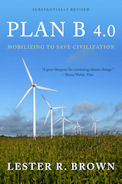
As you might have guessed, Plan B 4.0 is the fourth edition of the book originally published as Plan B in 2003, in which Brown tours around the trends of the vital services nature provides our civilization with and sketches how the worsening ones can be reversed. Previous editions have been published in almost any language, except in Dutch. But guess what: chances are serious that with 4.0 this is going to change.
In his address at the party Brown stressed the differences in this new edition. He said he is now convinced that food is the weak link. Past collapses of civilization have all been caused by failing food supplies, caused by various underlying trends, like soil erosion or salinization. Brown observes that the surges in food prices in 2007 and 2008 and the sustained higher-than-usual level since, are not event-driven, like the price peaks we've seen in the past, but trend-driven. Rising population, melting glaciers, falling water tables, rising sea levels, oil prices, they are all impacting food security. That's not a comforting observation. The second major revision in 4.0 offers some compensation: the growth in installed capacity of renewable energies is amazing, much faster than imaginable only two years ago. Brown referred to China's plan to develop four mega wind farms with a combined capacity of 105,000 MW (equal to 100 coal-fired power plants) and the recent launch of consortium Desertec, in which several of the most powerful German technology companies and investors will cooperate to harness the sun in Northern Africa and the Eastern Mediterranean to supply 15% of Europe's electricity demand in 2050. So "Mobilizing to Save Civilization" - the book's subtitle - seems to be happening indeed. And what is great about it, too, is that bottom-up and private initiatives are passing by the political process of depressing negotiations for a post-Kyoto climate deal, saying: "We can't wait any longer". Is it proof that the awareness or sense of urgency is reaching middle-aged people on key positions?
Brown explained the deeply serious topics with a calm appearance, soft voice and good humor. Authoritative, making the doom and gloom digestible, also if it wouldn't have been a home game. From what I've seen so far here in the States, his work and this book are still much needed. With a copy signed by the author we walked out into the nightlife around Dupont Circle. It rained lightly, so the crops would be safe, no worries here tonight.
No comments:
Post a Comment